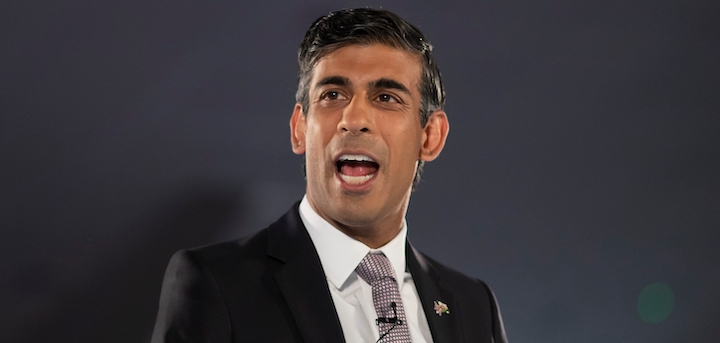Organisations representing local government have called on new prime minister Rishi Sunak to prioritise council funding and renew the government’s commitment to levelling up and devolution.
Sunak, the former chancellor and local government minister, was selected as Conservative Party leader today (24 October) and will be confirmed as prime minister tomorrow. In a short, filmed address he talked of the “profound economic challenge” facing the country and pledged to serve with “integrity and humility”.
Congratulating Sunak on becoming PM, Local Government Association chair James Jamieson said that central and local government had to come together to work in the best interests of residents and the wider public.
“Without certainty of adequate funding – and given the funding gaps they are seeing – councils will have no choice but to implement significant reductions to services, including to those for the most vulnerable in our societies,” he said.
“The government needs to ensure councils have the funding to meet ongoing pressures and protect the services that will be vital to achieve its ambitions for growth and to produce a more balanced economy, level up communities and help residents through this cost-of-living crisis.”
Without certainty of adequate funding – and given the funding gaps they are seeing – councils will have no choice but to implement significant reductions to services.
Turbocharged devolution
Similarly, the County Councils Network (CCN) highlighted Sunak’s previous support for devolution and how this can boost growth and level up communities.
Tim Oliver, CCN chairman, said: “Over the coming weeks, we urge his administration to renew its commitments to the levelling up white paper and turbocharge devolution, with at least two-thirds of CCN member councils beginning negotiations on a deal for their areas by the end of this parliament.”
The new government appears committed to publishing its fiscal statement as previously scheduled on 31 October, with Jeremy Hunt remaining in post as chancellor. It is likely to be very different to the ill-fated mini-budget of 23 September, with public spending cuts inevitable.
Oliver said that, with a cost-of-living crisis and low growth, councils more than ever needed to have access to the necessary funding to provide vital services to residents and support local businesses.
“That is why it is critical that any spending cuts do not fall on local government, with the government at the very least maintaining all the funding commitments made at the time of the Spending Review last year,” he said.
Oliver called on the prime minister to delay the forthcoming charging reforms to adult social care services. He said by delaying the reforms but retaining and reinvesting the funding in local government, it would help ease the inflationary and workforce pressures facing social care.
“We also urge the government to retain a commitment by the previous administration to rebalance funding between health and social care, allocating more of the £13bn committed to tackling the NHS backlog towards councils to help reduce pressure on social care services and the wider health system.”
It is critical that any spending cuts do not fall on local government, with the government at the very least maintaining all the funding commitments made at the time of the Spending Review last year.
Room151’s Monthly Online Treasury Briefing
October 28 2022
Online
Public sector delegates – register here
Stability and clarity
Meanwhile, CIPFA CEO Rob Whiteman said that Sunak’s first priority should be “balancing the books and reassuring financial markets”. But he pointed out that the recent performance tracker from CIPFA and the Institute for Government found there was “little fat to trim”.
He added: “I hope he [Sunak] swiftly produces a financial plan to bring some much-needed stability and clarity, while restoring fiscal discipline and respect for our independent institutions.”
Sunak was criticised for a a campaign speech in August when he suggested that as chancellor he had started to change formulas so that towns like Tunbridge Wells received funding rather than “deprived urban areas”.
—————
FREE weekly newsletters
Subscribe to Room151 Newsletters
Room151 LinkedIn Community
Join here
Monthly Online Treasury Briefing
Sign up here with a .gov.uk email address
Room151 Webinars
Visit the Room151 channel














